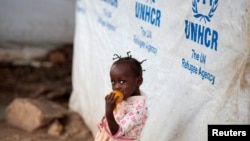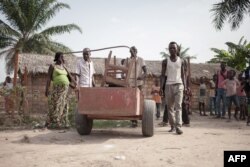A new report presents a dire portrait of the lives of hundreds of thousands of children in the Central African Republic. They live in a state of permanent crisis brought on by years of conflict and international neglect, a report by the United Nations Children’s Fund on the “Crisis in the Central African Republic” found.
The U.N. children’s fund considers the Central African Republic to be one of the most difficult and dangerous places in the world to be a child. And the statistics bear this out.
The new UNICEF report finds that 2 out of 3 children, or 1.5 million children in the C.A.R., need humanitarian aid to survive. It finds that tens of thousands of children suffering from severe acute malnutrition are at risk of death. It says children in this war-torn country live in a constant state of fear of being killed or subjected to abuse and violence.
UNICEF’s representative in the C.A.R., Christine Muhigana, says the children are in desperate need of the world’s support.
She says the country briefly made headlines five years ago when fierce fighting broke out in the capital, Bangui. Since then, she says, the C.A.R. has been forgotten, although the situation in the country has worsened.
“Children are at risk of violence, recruitment into armed groups, sexual violence, forced labor; malnutrition is a grave concern,” Muhigana said. “More children than ever are expected to need treatment for severe acute malnutrition next year because displaced families cannot farm.”
The lead author of the report, Marixie Mercado, notes that earlier this month, a UNICEF official warned of potential famine in the C.A.R. unless the security situation improves dramatically, and people are able to go home to cultivate their land.
“C.A.R.’s children should not have to wait for a declaration of famine until the world acts and provides more resources to the country,” Mercado said. “By the time famine is declared, if it is declared, untold numbers of children will already have died.”
UNICEF says it has received less than half of its $56.5 million appeal for C.A.R. funding this year. The aid agency says the money is needed to provide lifesaving food and medicine for severely malnourished children, as well as other needs like immunization campaigns and to provide clean water and sanitation.
UNICEF says the money would also be used to set up learning and recreational centers, to provide a space for children where they can retrieve a sense of normalcy and feel what it is like to be a child again.





